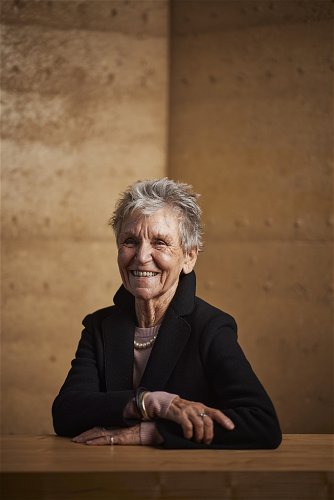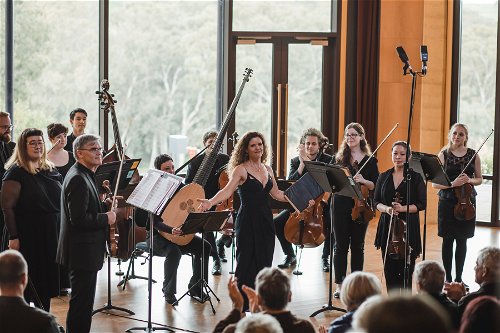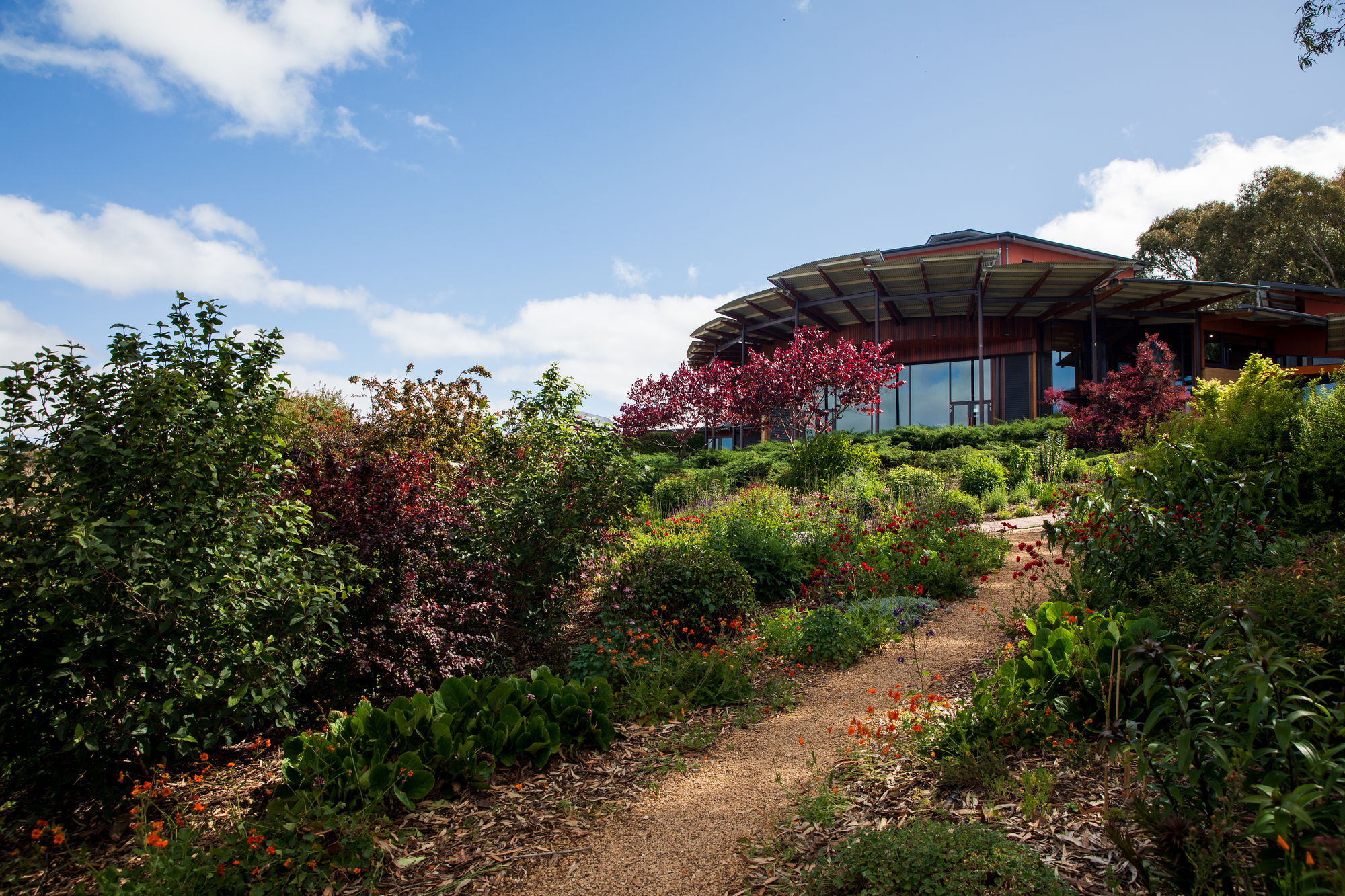
OUTSIDE THE BOX: AN INTERVIEW WITH COLEMAN ITZKOFF
BY RACHEL BRUERVILLE
Young American cellist and performer Coleman Itzkoff pushes the boundaries of what it means to be a musician in the twenty-first century, bringing his diverse range of interests and shape-shifting presence to every room and stage he occupies. Hailed by Alex Ross in the New Yorker for his 'flawless technique and keen musicality,' Coleman stands at the intersection of baroque, classical, new music, contemporary dance, and experimental theatre. Ahead of his Australian debut in Anthony Marwood's UKARIA 24, our Communications Coordinator Rachel Bruerville spoke to Coleman about how he first met Anthony; working with internationally celebrated composer Jörg Widmann, and what audiences can expect to hear in the extraordinary work Schwester Tod in the opening concert of UKARIA 24 on Friday 10 November (7.30pm).
How did you and Anthony Marwood first meet, and what has led to you being invited here to UKARIA?
Anthony and I met at another sort of heavenly, arcadian music festival – similar to this, but in southern Vermont – about six or seven years ago, a place called Yellow Barn (as it happens, that’s also when I met composer Jörg Widmann). Yellow Barn has been inviting Anthony there for something like twenty years, so when I first arrived, I knew I was in the presence of a legend! I was immediately struck by his rigor, and his brilliance; his focus and his stage presence – his artistry. Obviously, I was immediately a fan.
For the first few summers we didn’t get to play together, but we had this sort of musical crush on each other, and so we were trying to devise ways of working together. The first piece that we actually ended up playing together was Vivaldi’s The Four Seasons. I was playing principal cello, the continuo part, and he was the soloist: very different from any of these pieces we are presenting here at UKARIA! So that was our first collaboration, and we had such a blast that we've since found every opportunity to work together again.
We were at a party at Yellow Barn one night – that’s where all the best plotting happens for future work together – and he took me to a side room away from the main party and said, ‘I’ve got this idea to bring you out to Australia… ’ And I said, ‘Okay, yes please! Sight unseen, yes.’ So he told me about this magical place called UKARIA, and here I am today!

So, Anthony first experienced your performance of Widmann's Schwester Tod when he was in the audience at Yellow Barn in 2022?
Yes, he was probably playing something else in the program too, but he did witness this from the audience. At Yellow Barn, the audience is split, because it’s a summer music festival involving a lot of young musicians. The gallery is dedicated just for your friends – your fellow musicians – and then the general audience is on the floor, so he was up in the gallery.
That sounds like a mixture of being really friendly and also intimidating...
I guess you get used to the intimidation after a while! For this piece especially, we were really playing it up for the gallery. We had the home-team advantage, as it were, because it is just such an over-the-top piece. It might be a little bit bizarre for our audience here: it might be different to anything they have ever witnessed... but Anthony apparently liked it so much, that it was the first piece he decided to program here!
Could you tell us about your work with the composer?
Jörg Widmann was Composer in Residence at Yellow Barn for a few summers in a row, and it was there that I first worked with him, playing his first string quartet. At the time, he had written five string quartets, and we performed all five of them in different groups. Since then, I’ve played his amazing piano trio, a set of duos for violin and cello, and of course, Schwester Tod. I just find him one of the most fascinating and relevant composers of this day and age. And he’s a wonderful coach, too – he’s a musician of such intense curiosity, sensitivity and expression, and his music really pulls all of that out of you.
Looking at the score for Schwester Tod, it is extremely detailed. Is this a challenge?
It can be a little bit intimidating, for example, to see all of that German text surrounding how to play a single note! Jörg is famous for saying that he takes performers one millimetre beyond what they can do – beyond what they’re usually expected to do. He really does push that boundary. When you’re in the room it sometimes feels more like ten millimetres, but I think it’s really important to go for that, to dig that deep and really understand what he wants. Because at the end of the day, the piece is not done until the performers are giving it to the audience. And despite all of the hyper-detailed instructions (which can seem overwhelming), you want it to sound organic, and to feel intuitive.
Music is always the most intuitive thing. It speaks to our most ineffable and intuitive parts. Even though Jörg is incredibly detailed and specific about all of his directions, it all comes from a place of raw, human expression, and one must feel that every utterance is a natural and necessary part of the whole.
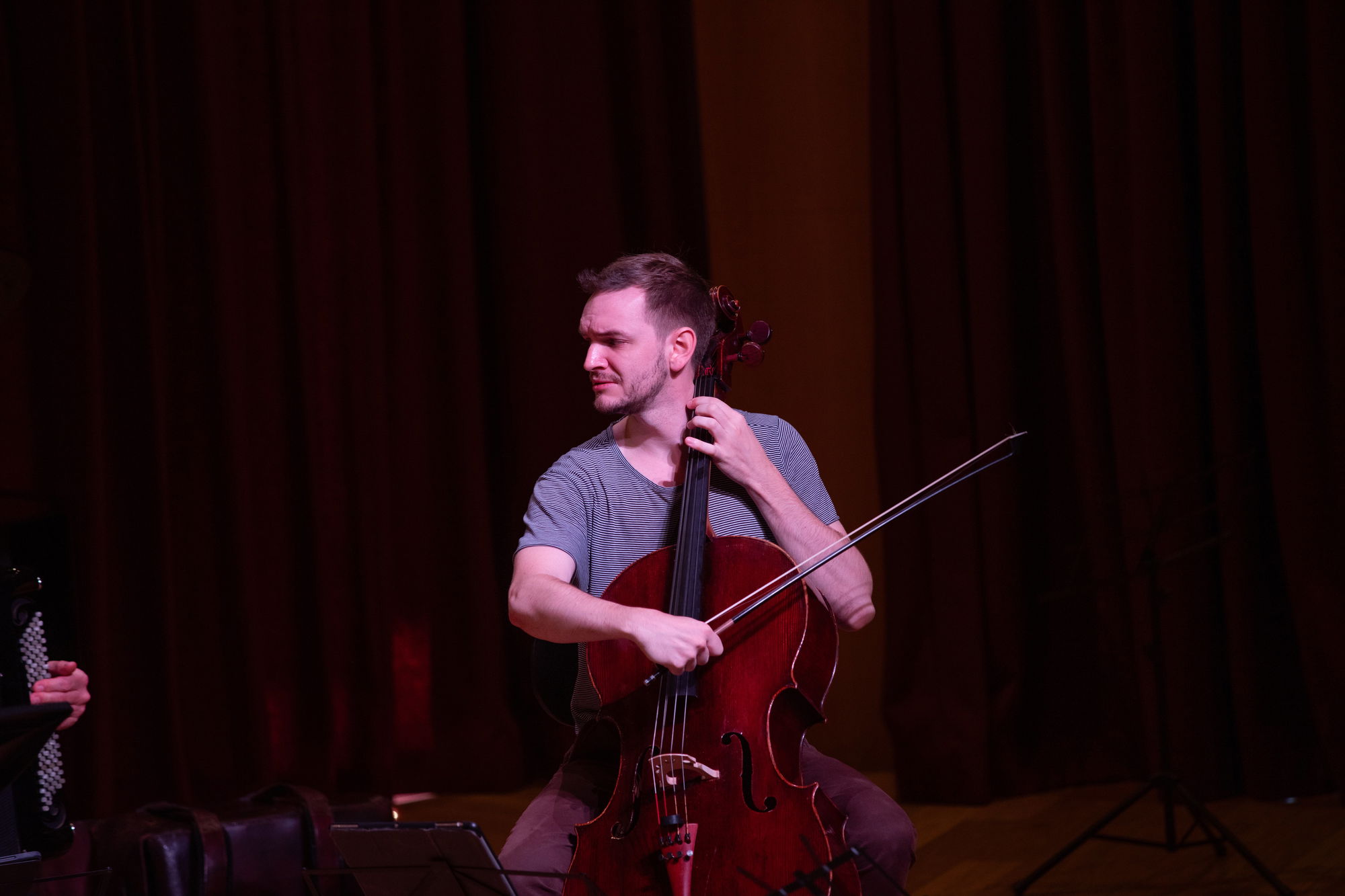
Amongst the players here for UKARIA 24 – yourself, Judith Dodsworth, Stefan Cassomenos and James Crabb – are you the only one who has performed this work before?
Yes, that’s right. I think each of us are finding our way… you can become overwhelmed with the wave of information coming at you, and not only on the page, but also in your ears. And it’s such a collage of timbres and musical styles – this is not only indicative of Jörg’s omnivorous tastes in music, but also of the world of Babylon, the full opera where this scene is from. The world that he’s painting... these collisions of cultures and languages – you get all of that in this Schwester Tod excerpt. Notably, the cellist Nicolas Altstaedt was the person who commissioned this work, and of course he is a previous curator here too [UKARIA 24 in 2018]. I’ve been a massive fan of his for my entire career.
The work tells a Eurydice-like story, with Inanna, the Goddess of Love, coming down to the Underworld to save her lover Tammu. I wish I’d seen the whole production of Babylon (this is one of seven scenes). This scene happens away from the main environment (being Babylon), and this is the only scene that is in a different place, in the Underworld.
James, Stefan and Judith are all world-class musicians, and it’s amazing that they’re all here. They have all picked up the work in the most amazingly quick time – when I first rehearsed this piece, we spent three weeks really digging into the work, and still in the performance we were discovering new things.
This week we have just four rehearsals, plus the dress rehearsal, and even today, after only two rehearsals, it’s like they own the piece, and they’re teaching me more about it too. It’s great to come back to it, because again, there’s so much detail – it’s like a great book you can read over and over again, or a great movie you can watch multiple times and still find new things. That’s always the mark of great music for me.
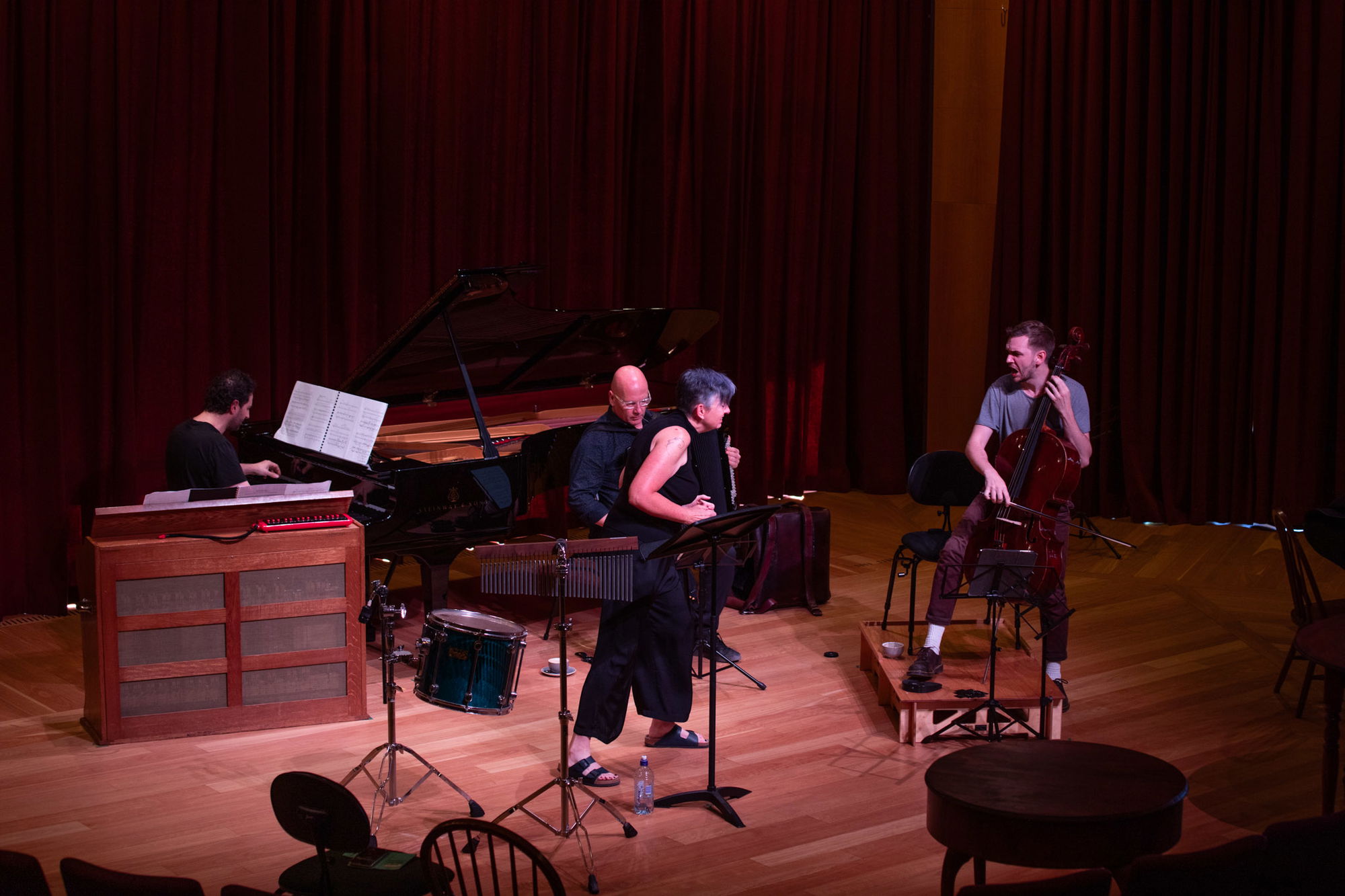
Performing this work with all its different, staged elements is not something that every musician would be able to pull off. How is it working with this ensemble?
For some additional context, about five or six years ago I was a founding member of a company in America called AMOC (American Modern Opera Company), which is a multi-disciplinary collective of dancers, singers, musicians, filmmakers, actors, writers, etc. Not long after we founded the company, I was asked to dance. And this was pretty serious contemporary dance with the most world-class modern dance company members. Surprisingly, I found the process of learning – and creating – choreography to be entirely familiar.
Later, I was on stage acting – performing text – and discovered how remarkably fungible it is from what we do as musicians: taking a text, or a map, and embodying it; making it your own, and then performing it with emotion and expression and humanity. It’s the same sort of hardware – it’s just slightly different software. And it’s such a wonderful challenge, too – it keeps you learning; and helps maintain your neuroplasticity, as the neuroscientists would say. I’m following the lead of many, many others who have been doing this sort of thing forever; my favourite artists tend to have an incredibly wide spectrum of musical tastes, and then beyond that, more worldly artistic tastes. They refuse to be put in a box. Not that I don’t love my ‘box’ of being a cellist – I’ll always be a cellist first – but I love challenging myself, and I feel very inspired by these other artists.
For the audience, I think this performance is going to ask for a degree of suspension of disbelief that perhaps they might not be used to, but if they give themselves over to it, open themselves up, I think they’ll have a really enjoyable experience. I also have to say that I’m not the only one doing different things on stage: Judith is whistling, playing tom-tom and a melodica; Stefan is singing too! James is adding a lot of spirit and colour to the performance as well – all of these three artists are just so extraordinary in their range, and they really inspire me. They’re all such incredible, world-class artists, and I feel very lucky to be working with them.
Coleman Itzkoff performs Jörg Widmann's Schwester Tod with Judith Dodsworth, Stefan Cassomenos and James Crabb at UKARIA 24 in Concert One (Friday 10 November, 7.30pm). You can also hear Coleman perform in Concert Two (Saturday 11 November, 4.00pm); Concert Three (Saturday 11 November, 7.00pm); Concert Four (Sunday 12 November, 11.30am) and Concert Five (Sunday 12 November, 2.30pm).




